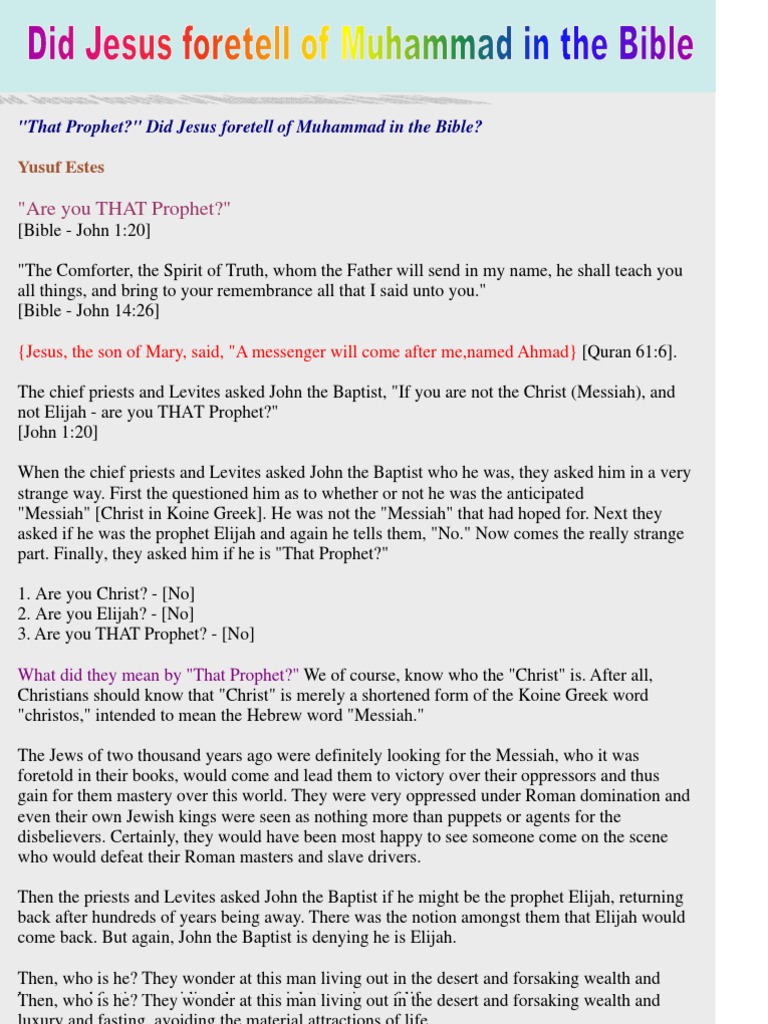The inquiry into whether Jesus foretold the advent of Muhammad is an endeavor embedded in theological discourse and historical investigation. This question resonates profoundly across interfaith dialogues, particularly among Bahá’ís, who regard both figures as pivotal manifestations of God’s will. The significance of this inquiry lies not merely in doctrinal affirmation or denial but in the nuanced understanding it offers of religious continuity and evolution within the context of divine revelation.
Historically, Jesus Christ, the central figure of Christianity, is seen as having established a foundation of faith that would catalyze subsequent revelations. In the Gospel of John, Jesus speaks of the coming of a Comforter, or advocate, which many interpret as a prophesy of further divine guidance. The term “Comforter” has been interpreted variably throughout Christian history, leading to diverse theological considerations. Some Christian doctrines maintain that this reference points to the Holy Spirit, while others, particularly in prophetic contexts, speculate that it may align with the emergence of Muhammad, whose role as a prophetic figure is acknowledged in Islamic theology.
In the Bahá’í faith, the significance of Muhammad is elevated through the lens of progressive revelation. Bahá’ís believe that God communicates with humanity through a series of Manifestations, each bringing teachings that correspond to the cumulative spiritual needs of society. This perspective frames both Jesus and Muhammad not as divergent or opposing figures but as complementary towards the unfolding of divine purpose. The recognition of Muhammad as a successor in the prophetic lineage invites Bahá’ís to delve deeper into the teachings and lives of these figures to understand their interconnection.
The prophesied Comforter in Jesus’ teachings is often correlated with the concept of the “Seal of the Prophets,” a title attributed to Muhammad. This understanding invites exploration into the traits and missions of subsequent religious figures. For Bahá’ís, the prophecy concerning the Comforter signifies the continuation of divine guidance culminating in Bahá’u’lláh, the founder of the Bahá’í faith. The seamless interplay between these spiritual leaders illustrates a paradigm of ever-unfolding truth and wisdom, challenging believers to consider the implications of their interconnected revelations.
Moreover, examining the textual evidence from both the Bible and the Qur’an reveals fascinating intersections. While Christianity posits a fundamentally new covenant through Christ, Islam reinforces continuity by affirming Jesus as a prophet. The Qur’an portrays Jesus as a precursor to Muhammad, thus establishing a theological bridge. Surah Al-Imran acknowledges the miraculous birth of Jesus and his pivotal role while reinforcing that Muhammad is to follow, further solidifying the interconnectedness of their messages. The subjective interpretations of these texts can yield nuanced discussions and a broader understanding of spiritual truths shared through different lenses.
This intertextual dialogue raises questions regarding the nature of prophecy itself. Prophecy, in its essence, is often understood as divine communication pertaining to future events or revelations necessary for humanity’s spiritual advancement. The anticipation of future manifestations allows communities to foster hope, purpose, and continuity. In the context of Bahá’í teachings, this becomes a vital conduit for explaining the importance of accepting successive prophets, as each brings forth renewed spiritual understanding suited to the evolving moral and social milieu.
The implications of this belief extend into the realm of ethical responsibility and community building. Bahá’ís are encouraged to engage in dialogues that emphasize shared values between religions rather than focusing on differences that segregate. This principled approach motivates communities to discover common ethical underpinnings, as both Jesus and Muhammad provided guidance catering to the socio-spiritual needs of their respective eras. Through emphasizing unity and collaboration, individuals are encouraged to cultivate a broader understanding rooted in compassion, justice, and service, which transcends mere theological debate.
Engagement with the topic also invites a consideration of historical context. The societal and cultural dynamics during the times of Jesus and Muhammad greatly influenced their messages. Understanding these contexts sheds light on the multifaceted horizons of their prophetic missions. It becomes evident that conflicting narratives often arise not solely from fundamental misunderstandings but from the differing historical realities faced by these leaders. Examining these subtleties allows for a richer exploration of both figures, laying the groundwork for an inclusive approach to spirituality.
Furthermore, the exploration of Jesus’ potential foretelling of Muhammad catalyzes discourse on the evolution of religious thought. The dynamism of truth as a concept in the Bahá’í faith posits that divine revelation is not static but responsive to humanity’s evolving comprehension. This evolving understanding positions Bahá’ís to appreciate the encompassing narrative of divine history, which is replete with milestones marked by prophetic figures striving towards the ultimate enhancement of human unity. This fluidity encourages an approach that champions dialogue over discord, underpinning the central Bahá’í tenets of love and unity.
In conclusion, the anticipation surrounding Jesus’ prophesies regarding Muhammad reflects a profound exploration of interconnected spirituality. Bahá’í teachings embrace these figures not as isolated points in religious history but rather as integral parts of a cohesive narrative promoting a unified approach to faith. Delving into these connections illuminates the importance of understanding religious figures in their broader historical and theological contexts, thereby fostering an inclusive dialogue that unites rather than divides. The exploration deepens a collective appreciation for the spiritual treasures that each prophet brings forth, highlighting humanity’s shared quest for understanding and enlightenment.
